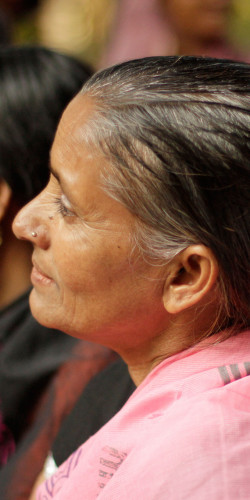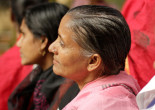


About
Storytelling with Saris is a multi-layered collaborative art and advocacy project that uses woodblock prints on saris, writing, oral history, performance, and film to empower communities in the U.S. (and Europe) to address climate justice in solidarity with the women of Katakhali Village, an island community in Bangladesh on the frontlines of climate change. Artist and environmental lawyer/activist Monica Jahan Bose, whose maternal roots are in Katakhali, is collaborating with 12 women from Katakhali who have recently acquired literacy and climate adaptation skills and are valiantly fighting climate change, despite losing their homes after repeated severe cyclones. The longterm project highlights and documents the Katakhali women’s personal stories as inspiration for others to act.
Through performance art and advocacy workshops and climate art actions in the U.S., Bangladesh, and Europe, communities are engaged to take action to fight against the devastation of our planet. Americans are learning about climate change through the project and making written commitments on saris to reduce their carbon footprint in an act of cross-border solidarity. Many of the U.S. climate pledge saris are returned to Bangladesh and worn by the women of Katakhali. Storytelling with Saris performances, art actions, exhibitions, and engagements have taken place in Hawai’i, Iowa, Maryland, New York, New Jersey, Pennsylvania, Virginia, Washington, D.C., California, and Wisconsin in the U.S.; Dhaka and Katakhali in Bangladesh; and in Paris, France, Athens, Greece, and Rome, Italy.
The women of Katakhali are part of an eco-empowerment program started by Samhati, a US-based non-profit group of Bangladeshi-American women. Katakhali is located on Barobaishdia Island (Patuakhali District) in the Bay of Bengal. Commenced in 2012, Storytelling with Saris will continue indefinitely with a focus on gender and climate justice, including research and community education on climate change mitigation and adaptation. Women disproportionately suffer the impacts of climate change because of cultural norms and the inequitable distribution of resources and power, especially in developing countries. Women’s leadership is also critical to addressing climate. The project presents and preserves women’s stories from a remote community (with negligible carbon footprint) that may disappear unless urgent global action is taken.
Funded in part by the D.C. Commission on the Arts and Humanities, an agency supported in part by the National Endowment for the Arts.
All images and text copyright © Monica Jahan Bose, 2012-2021. All rights reserved.
-
Recent Posts
-
Bookmarks
-
Archives
- March 2024 (3)
- January 2024 (2)
- December 2023 (1)
- October 2023 (1)
- August 2023 (1)
- April 2023 (1)
- January 2023 (1)
- December 2022 (1)
- October 2022 (2)
- June 2022 (3)
- May 2022 (1)
- January 2022 (1)
-
Recent Comments



